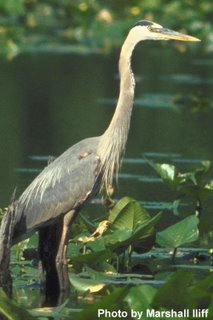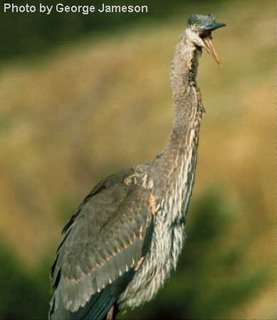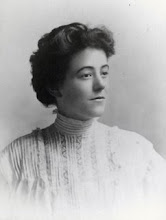

Being a 365 days per year walker of shores yields much bounty, most all of it pacifying and inspiring. Today, however, I have sad news to tell. Traveling along the expansive beach at Grand Mere State Park, I found two dead great blue herons, an adult and a juvenile. They had been shot.
The Great Blue is a magnificent bird, a friendly giant of the Great Lakes waterways, graceful and remarkable for its blue legs. The other giant is the Sand Hill Crane, which flies with its neck extended, where the Great Blue holds his close to its body in flight. That's the way I was taught to tell them apart at a distance.
Grand Mere is a wonderful 1200 acre reserve with giant dunes and woods and a passage to the shoreline which one can travel for several miles. The Cook nuclear plant is the southern-most limit. Unfortunately, hunting begins in late September, and as far as I can tell, hunters can shoot in any part of the park. You'd have to be pretty drunk or blind to mistake a heron for a duck, and killing a juvenile may be against the law. I do know that there is no open season on herons, and I'm pretty sure that shooting something along the Lake Michigan shoreline is verboten.
Some stupid kid or crazed testosterone poisoned jerk killed these birds. One day earlier this fall, I was entering the wooded part of one of the trails, and ahead of me was a fat, lumbering hunter with a shot gun slung over his shoulder, looking like Elmer Fudd, except he was wearing a neon orange stocking cap. I retreated and called the local police not realizing that it was A-OK for him to shoot at will. There were and are no signs advising mere walkers and bird watchers to wear red or orange clothing. It's nuts. but the Michigan DNR is very pre-occupied with revenue, and hunters' license fees must add up.
There are spent orange shotgun shells littering the woods, and no park rangers are present a lot of the time. Park management is haphazard. Michigan used to be a most intelligent state regarding its landscape and resources. If hunting and park uses were combined, there would have been signs advising the public of the facts and probably segregated sections set off for each. It's jarring to observe what has happened to Michigan which once understood the importance of keeping up appearances. More than once I've encountered people from out of state who are spending money in hotels and restaurants and gas stations in the area and have chosen the spot because of the proximity to the lake and ample public access. If Michigan wants tourist dollars, a few simple improvements to the lakefront parks would reinforce the state's commitment to making outsiders feel welcome.
